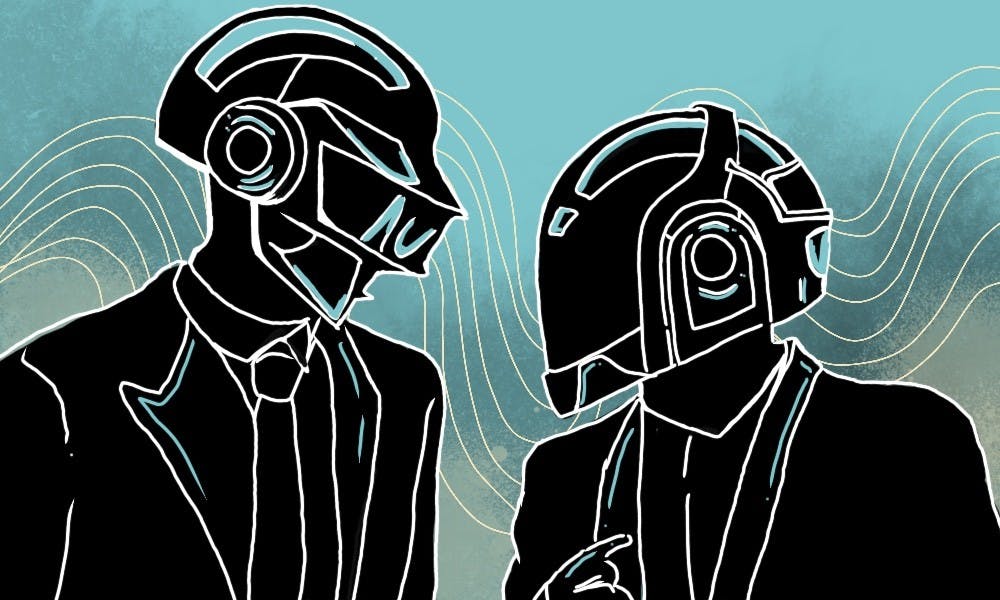French house, a musical genre often defined as a combination of Euro disco and Deep house, used to be everywhere. You definitely know it if you’ve ever heard anything by Daft Punk prior to Random Access Memories (perhaps "One More Time" or "Harder Better Faster Stronger") or "D.A.N.C.E" by Justice. Characterized by head–banging drum machines, glittery synthesizers and sequencers, and filtered samples of '70s and '80s music, French house can be seen as the bass–head electronic cousin of disco. Yet, despite the genre itself being just barely 3 decades old, we are beginning to see it die out.
The most well–known French house artists, particularly Daft Punk and Busy P, are adjusting to new tastes. Daft Punk’s latest album, Random Access Memories, is inarguably one of their best and yet, it is a complete departure from the original sound of the French duo that launched them to fame. Upon listening to the hits from Daft Punk’s stellar sophomore album, Discovery, one can immediately recognize the signature trappings of French house. Many memorable solo tracks off Discovery—including “Aerodynamic,” “Harder Better Faster Stronger,” and “One More Time”—are hallmarks of Daft Punk’s sound in the late 1990s and early 2000s, with pounding drums, rapid, chopped samples, and groovy synthesizers. “Aerodynamic” features a warped, shredding electronic guitar solo, while "Television Rules the Nation" (off their next full–length album, Human After All) utilizes a dark, ominous beat—both staples of typical French house.
However, fast–forward to 2013’s Random Access Memories, and Daft Punk has shifted to a whole new sound. Gone are the rapturous drums, the electronically–modified guitar, and the menacing beat. Instead, Daft Punk blazed a completely new path, abandoning the French house sound for something more like smooth disco. Daft Punk even called on Giorgio Moroder, a man known as the “Father of Disco,” for a feature on a nine–minute groove of a song titled “Giorgio by Moroder,” and recruited Pharrell Williams for the smooth track "Lose Yourself To Dance" and the global mega–hit, "Get Lucky." Daft Punk clearly recognized a shift in their sound was necessary for widespread success, and they certainly saw more success upon departing from French house—Random Access Memories debuted at number one on Billboard’s Top 200, selling 339,000 copies in its first week alone.
The men behind Daft Punk, however, are not the only ones to have seen the writing on the wall. Another pioneer of French house, Busy P, has shifted his sound recently to appeal to more mainstream tastes. His newest song, “Genie,” retains many signature aspects of French house—a chopped sample and funky synthesizer—but cuts the static sounds and foreboding tone which used to be more common on his tracks from years prior. Clearly, Busy P has also identified a trend in which slightly shifting sounds may appeal to a broader audience, as the tone of many typical French house songs can easily come off as aggressive, intimidating, and unwelcoming to the casual listener.
However, some artists are not lending credence to the notion that French house is dead, as Parisian duo Justice has continuously combined elements of disco, funk, metal, and house into their take on French house. Their debut album, Justice, was one of the best French house albums of the 20th century, featuring standout hits such as “D.A.N.C.E, ”“Genesis,” “DVNO,” and “Phantom/Phantom Pt. II.”
Yet, in both their 2011 album Audio, Video, Disco, and their 2016 album Woman, the French duo manages to hang onto the hallmarks of French house without experiencing a dip in popularity. Granted, many of their newer songs are undoubtedly influenced by other genres—Audio Video Disco’s “New Lands” and “On’n’On” could easily fit into any soft rock playlist, while the chorus and expansive instrumental on Woman’s “Safe and Sound” hardly fit into the mold of French house’s dark and gloomy production—but their French house sound is still, for the most part, ever–present.
From a broad perspective, it's clear that French house is in the midst of a serious decline, as most pioneers of the genre are shifting sounds or combining French house with other genres. Other former leaders of the genre have simply fallen off the map. For instance, the French DJ SebastiAn, best–known for his song “Embody," simply hasn’t released new solo music in over nine years. While the genre may lack radio appeal or chart–topping hits these days, the decline of French house marks a saddening end to a thriving time for electronic music.







